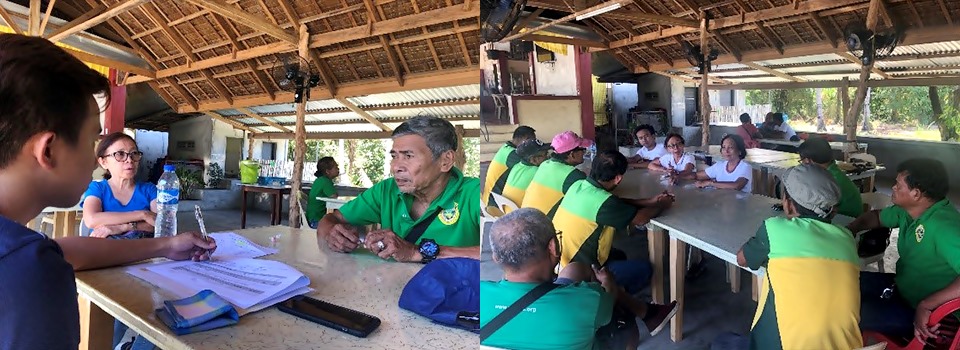 Interview with the calamansi processing plants in San Teodoro (left) and Naujan (right), Oriental Mindoro
Interview with the calamansi processing plants in San Teodoro (left) and Naujan (right), Oriental Mindoro
ORIENTAL MINDORO, Philippines - A baseline study for the project Upgrading the Calamansi Value Chain towards Improving the Calamansi Industry of Oriental Mindoro was conducted by the project team composed of staff from the University of the Philippines Los Baños (UPLB) and partners from Mindoro State College of Agriculture and Technology (MinSCAT) on 22-26 April 2019. Farmer-members of the Victoria Kalamansi Farmers Federation (VKFF), traders, and processors in the municipalities of Victoria, Naujan, and San Teodoro, Oriental Mindoro were interviewed.
Of the eight groups of processors interviewed, six are led by females, who are either the general managers or the processors-in-charge. As observed, females involved in the processing of calamansi have better interpersonal skills as compared to the males, which are needed in the marketing of the products. From the recent trip, two calamansi processors, both headed by women, were interviewed in Naujan and San Teodoro. Tugdaan, a processing plant in Naujan run by the Mangyans, continues to thrive in their production as evidenced by their current start to relocate their processing plant to a new and better building. The Mangyans get the raw materials, which are organically grown, from the farms of other members of their community. On the other hand, calamansi concentrate processed in San Teodoro has already reached the markets of Valenzuela in Metro Manila and Oriental Mindoro's neighboring provinces of Romblon, Batangas, and Marinduque. The expansion of their market can be attributed to good marketing strategies of the members. In terms of innovation, they designed their processing equipment, such that it does not require trimming the stem before juice extraction.
 Interview with local calamansi traders in Victoria, Oriental Mindoro
Interview with local calamansi traders in Victoria, Oriental Mindoro
All three local traders interviewed ship the produce mainly to bodegas in Divisoria and Pasig in Metro Manila, and in Batangas. They get their supply of calamansi from the farmer-members of VKFF. The traders' main concern, however, is the decreasing supply, as the lean months approach.
 Focus group discussion (FGD) with calamansi farmers in Victoria, Oriental Mindoro
Focus group discussion (FGD) with calamansi farmers in Victoria, Oriental Mindoro
VKFF currently has 18 active members and is male-dominated, with 17 males and only one female. The organization continues to produce calamansi concentrate, which serves as an additional source of income for its members. Raw materials are gathered from the members who all own at least one hectare of land planted to calamansi. During the focus group discussion facilitated by Dr. Thelma Paris, Gender Specialist of the project, the team learned that the organization's market is still limited, and thus, proper marketing and delegation of tasks among members are imperative, to overcome this limitation.
The Value Chain Analysis and Market Study component of the project is led by Dr. Matilde V. Maunahan, Study Leader and University Researcher II of the Postharvest Horticulture and Training Research Center of the University of the Philippines Los Baños (PHTRC-UPLB). (Christiansen D. Aguila and Reymond Denver Q. Buenaseda)